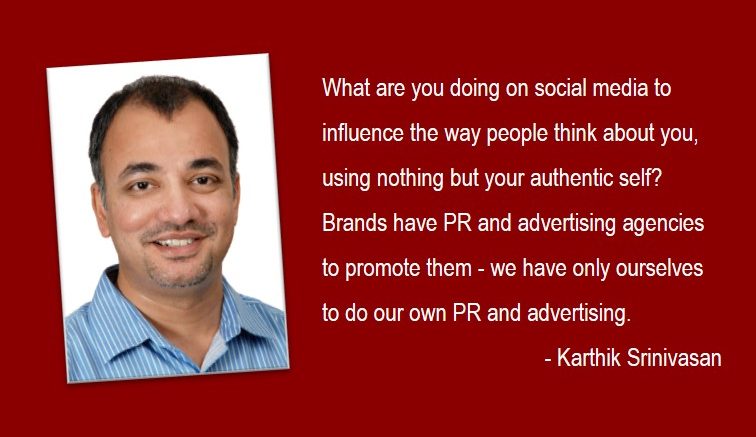Depending on which source you choose to refer, there are about 450 million internet users in India. Out of this, about 250 million are supposed to be using social media actively.
In India, Facebook is said to have 250 million users (for many people Facebook is the internet, one reason why the Election Commission partnered with Facebook for the first nationwide voter registration reminder campaign!), while LinkedIn and Twitter are said to have more than 40 million users each.
Global Web Index uses surveys to ascertain and extrapolate data on internet usage. Based on its mid-2017 data, here are some startling data points about India. The average time spent on the internet per day using any device is 7 hours and 25 minutes, while internet use per day on mobile devices alone is 3 hours 23 minutes. The average time spent per day on social media is 2 hours and 26 minutes!
What do Indians do in those 2 hours and 26 minutes?
Beyond these staggering numbers, we generally know that most people are reasonably active on Facebook. They perhaps have a nominal profile on LinkedIn that was updated several months ago. And they probably visit Twitter once or twice a week. These days, it feels definitely better when you complain about a service provider on Twitter (public shaming) instead of emailing them or waiting on the phone to talk to a customer service agent – so having a Twitter presence helps!
They are also part of at least three WhatsApp Groups – usually two alumni groups and one belonging to the extended family. And they watch a lot of videos! They do stumble upon some topical news on some of these platforms, but essentially, for most people, all of this is good time pass.
Hold on to that thought …
Which mobile phone did you buy last? Or car? Whichever brand you went with finally, you did search Google for reviews about that phone, I’m sure. You saw the brands’ own product pages, went through all the details, including the fine print (on mileage and financing, for the car; on battery life, for the mobile phone). You read professional reviews about the mobile phone or car. You asked friends on Facebook and WhatsApp and you took their feedback. For the car, a visit to TeamBHP’s forums would have been absolutely necessary, I assume. And then, you made your decision.
Now, let’s get back to the use of social media and internet again.
What if you, as an individual, were a product? For any purpose/reason – for a job, on Tinder, for a hobby, for a friend you want to help, to join a cause… anything. What does your own ‘brand page’ say about you? What do others say about you? Is there enough information about you online that either you say about yourself or others say about you that can help someone else make a decision about you? More importantly, are you on top of the narrative about you online? Are you projecting the most appropriate things about yourself, towards achieving some purpose?
‘Time pass’ use of social media is passé. It is unproductive and doesn’t help you in any way. You’d need to take on an active role in curating your own persona online. Why? Because, before you meet or interact with someone (for whatever purpose), they name-search you online. And go through what you have written in assorted places on the internet. You may not have met them at all in your life, but your online utterances help them become familiar with you. In essence, your online projected self is the new business card. It’s your own life’s trailer, one tweet or one LinkedIn post at a time.
We are at a stage in our society where there is heightened scrutiny around how social networks influence people. Here’s the twist: what are you doing on social media to influence the way people think about you, using nothing but your authentic self? Dress smartly, have a good handwriting, get your grammar right, know your table manners, learn public speaking, focus on your body language… these have always been told and taught in various ways to us. But because social media was free—and fun—nobody taught us what to do on it and how to go about it.
Brands have PR and advertising agencies to promote them – we have only ourselves to do our own PR and advertising. After all, if we do not take charge of our own narrative, who will? And it all starts with defining the contours of our personal brand just like how brand managers do it for brands!
The views expressed here are that of the author and do not necessarily reflect that of Reputation Today.



Be the first to comment on "Building brand YOU online"